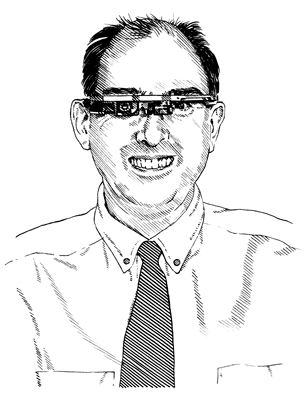
February 20, 2014
Gillian Philipupillai
In a recent editorial for MIT Technology Review, Professor Steve Mann of The Edward S. Rogers Sr. Department of Electrical & Computer Engineering advocates for the rights of individuals who both use and rely upon wearable technology. Twenty years ago Professor Mann was a founding member of MIT’s wearable computing lab, establishing a reputation as the “father of wearable computing.” Today, as wearable technology like the Google Glass sits on the brink of mass adoption, Professor Mann argues that banning wearable computers from certain spaces constitutes discrimination against users of these assistive devices.
“Let’s value people at least as much as we do merchandise and elevate the wearable computer to the level of a security camera,” writes Professor Mann. “We never forbid cameras to protect five-cent candies. So let’s not forbid people to protect themselves with this same kind of technology.”
With more than 35 years of experience field-testing wearable computing, Professor Mann has been a prominent voice speaking out about its social implications, as well as the place of surveillance and sousveillance in everyday life. Professor Mann has contrasted the terms surveillance (‘to watch from above’) with sousveillance (‘to watch from below’), arguing that sousveillance is an important check to asymmetries of power built into surveillance systems.
While wearing his ‘digital eye glass’ augmediated reality vision system, Professor Mann has experienced the effects of retail establishments that ban cameras as seeing aids and even harass their users. On July 1, 2012 Prof. Mann was physically assaulted by three McDonald’s employees because he was wearing the digital eye glass in the establishment.
Following his encounter with what he has since termed ‘McVeillance,’ or an imbalanced system where surveillance occurs in concert with the strict prevention of sousveillance, Professor Mann co-sponsored the Mann-Wassell Law in the New York State Assembly. The Mann-Wassell Law seeks to protect personal sousveillance by recognizing its benefit while also elevating its legal recognition to that of surveillance. Professor Mann also chaired the IEEE International Symposium on Technology & Society on the subject of veillance that was held in Toronto in June 2013.
Prof. Mann’s experiences and insights have been highly sought-after as wearable computing becomes more widespread. In his editoral, Professor Mann argues that it is a basic human right to have access to the data generated by one’s own senses and that banning wearable computing devices infringes upon this right.
More information:
Gillian Philipupillai
Communications Assistant
The Edward S. Rogers Sr. Department of Electrical & Computer Engineering
416-978-1999; gillian.philipupillai@utoronto.ca